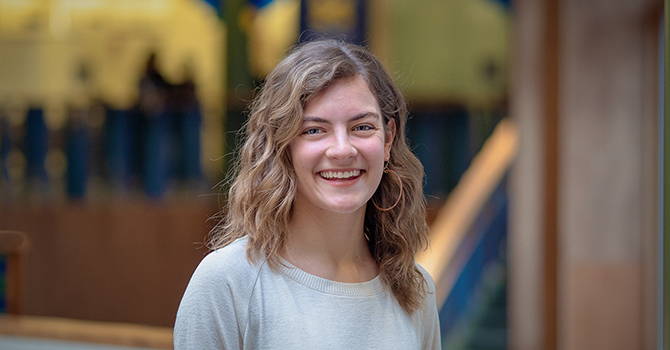Rooted in a Family History of Health Work

Clara Schriemer
Master’s Student in Global Health Epidemiology, Gelman Global Scholar, Fedor and Mechthild Medzihradsky Global Intern
I am the daughter of two physicians—my mom is an anesthesiologist and my dad is a family doctor. At family dinners each night, they often discussed interesting or challenging cases from their work that day. My dad’s practice is just a block from the house I grew up in, which is just another block down from my elementary school. When school was canceled or we had a half day, I would walk to my dad’s office and the nurses would give me jobs like stapling papers or coloring assignments. I was delighted to be “helpful” and loved the energy and excitement of the doctor’s office.
I grew up in a small town called Vicksburg, Michigan, which instilled in me a concern for my neighbors. My parents have always been active community members, modeling service and community engagement. When I was in elementary school, my mom and her friends founded a nonprofit called Generous Hands Inc., which provides backpacks of food for food-insecure children every weekend. Throughout my childhood, I regularly participated in Generous Hands fundraisers: packing backpacks, organizing a peanut butter drive at school, and so on. The idea that I should use my education and talents to help others is fundamental to my upbringing, and it drives my interest in public health today.
During high school, I attended the Health Careers Institute at Dartmouth, where my view of the health field was expanded by accomplished and inspiring health professionals who represented a wide range of careers. I clearly recall a cool, articulate epidemiologist who described her job as “disease detective.” She described contact tracing during outbreak investigations and infection prevention strategies. I had always thought that a career in healthcare meant being a nurse or a doctor, but the institute helped me see the vast array of careers that existed beyond clinical care. Notably, it introduced me to public health and the field of epidemiology.
Pursuing my curiosities, I shadowed a number of physicians in high school and my first year of undergraduate studies at Hope College. I enjoyed the experiences, but clinical work didn’t really grab my interest, so I explored other areas of health. My undergraduate advisor was a public health practitioner who was very passionate about her work. She invited me to a public health conference focused on racial disparities in Kalamazoo, and my interest was again piqued.
My first true public health experience came during my last semester at Hope, when I worked part time for a nonprofit called Aqua Clara International (ACI) and stayed on the year following my graduation. ACI makes sustainable and scalable water filters for use in low- and middle-income countries. From bench-level research and design of water filters to filter construction to implementation and maintenance in Nicaragua, I had a hand in each part of the process.
Partnering with local communities to create this evidence base and empowering them with the resources they need to create beneficial solutions is, in my opinion, public health at its best.
After completing my bachelor’s degree, I spent five weeks in Nicaragua with ACI repairing and monitoring bio-sand and hollow-membrane filters in rural homes. One moment in particular during this trip clarified my aspirations for a career in public health.
A coworker and I were conducting a basic lab test to assess the presence of E. coli and coliforms in water samples from a small rural community in Nicaragua. As we recorded the results of the simple field test, the family of a community partner gathered around us. I explained the basics of the investigation and showed them samples from unfiltered sources riddled with evidence of bacteria, then spotless samples from water that had passed through bio-sand filters.
They were shocked. Though the unfiltered water they drank appeared clean, it was full of disease-causing agents. The mother pointed to the growth on a sample from the river and scolded her young son, “you drink from the river all the time!” That interaction demonstrated the importance of empowering individuals, especially in marginalized communities, with the data necessary to make informed decisions about their health.
This sparked my interest in epidemiology. Epidemiology is a tool that can be used to build an evidence base that can link exposure and disease. Partnering with local communities to create this evidence base and empowering them with the resources they need to create beneficial solutions is, in my opinion, public health at its best.
I chose to pursue epidemiology at Michigan for many reasons. Notably, coming to Michigan Public Health gives me an opportunity to study global epidemiology, a unique track that offers rigorous methodological and quantitative training in addition to a global focus.During a campus visit, I recognized how the collaborative atmosphere, the abundance of research opportunities, and the faculty accessibility would make Michigan a great fit for me.
After completing my MPH this spring, I plan to begin a PhD program in Epidemiology or Maternal and Child Health to study reproductive, perinatal and postpartum health. Following the completion of my doctoral degree, I hope to serve as an epidemiologist within a department of Obstetrics and Gynecology to study pregnancy care. I would like to spend my career working to improve the clinical management of pregnancy and postpartum care to reduce maternal morbidities and improve neonatal health.
- Read more about Clara's research into postpartum care.
- Learn about her global public health experience in Ghana.
- Help support global public health students at Michigan Public Health.
